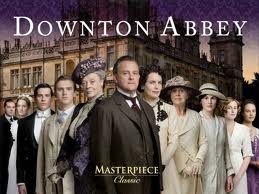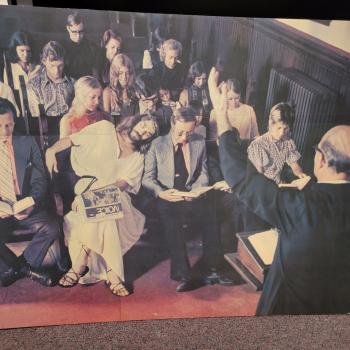Those of us who love the BBC/PBS dramas are well familiar by now with the quality of such shows. They make most American made TV programs look like pure drivel, or worse. There is a reason for this. Britain is a more literate society. People actually read serious fiction, care about their history, think a mind is a terrible thing to waste on drivel or endless video games for that matter. I quite agree.
Into the lists of such serious period drama comes Downton Abbey, set at the outset of the 20th century, and so in the early post-Victorian period when the world was indeed being changed by innovations like cars and telephones and the women’s suffrage movement, and of course WWI, which blew to bits the last vestiges of certain aspects of Victorian society. If you liked the King’s Speech, you will like this drama.
The story, as told by Julian Fellowes, is actually set at Highclere Castle in Berkshire, though it is a pleasant fiction that it is set in Yorkshire with the earl of Grantham (played splendidly by Hugh Bonneville) being the head of Downton Abbey and the Crawley family. On the surface this series, which has just completed its second season (about 15 fullish episodes thus far), might appear to be just another soap opera, but with a difference. The house itself is a major character in the drama. Life goes on in, and revolves around the house– which must be saved, staffed, found heirs for, and the like. The property runs the persons, rather than the other way round. It is a familiar, and true story, well…. true enough.
Let us speak for a moment about the cast. It is nothing short of spectacular. It involves only one familiar American in it (who plays the wife of Lord Grantham– Elizabeth McGovern), but no matter. You have wonderful actors and actresses of all ages from England, Scotland, Wales, Ireland, and if you’ve lived in the U.K. you will immediately recognize the differences in accents. It adds flavor to the stew. And yes, it should be said that the story is a bit of a stew— sometimes tasty, sometimes boiling over, sometimes with too much saccharine, sometimes with too much salt, but altogether delightful and easy to consume.
What I mean is, the story is rather a soap opera. But unlike most American soap operas, you actually care about the characters in the story and you want it to turn out well. There are people falling in and out of love, in and out of bed (though discretely of course). There are servants coming and going, and it’s a bit of an upstairs downstairs story– the servants downstairs and the high and mighty upstairs.
It tells the plight and pleasures of the servant class beautifully, but it also tells the story of the aristocracy fairly. Britain was very much a class society, with rather rigid rules and barriers for and between the classes. One must never get above one’s ‘station’ in life. And yet, all that was beginning to crumble between the sinking of the Titanic and the real beginning of the post war period in 1920.
The arc of the narrative for the first two seasons encompasses precisely that period from just after the sinking of the Titanic in 1912 until New Years in 1920. It shows us the many changes that came upon British society during that period. There were cads and scoundrels, bounders and opportunists, sinners and saints, loyal husbands and wives, rebellious and obedience children, the usual lot you would find in society at any time. Downton is depicted quite effectively as a microcosm of that society in flux.
What prevents the story telling from being too heavy or heavy handed is, among other things, the comic relief of Granny— aka Maggie Smith who is stunning as the dowager matriarch of the Crawley family. When one unpleasant suitor of Mary the oldest daughter (the man is ‘new money’ being a rich newspaper baron from London) threatens to never visit Downton again, Granny says– “really… you promise?”
Even if post-Victorian soap opera is not your cup of British tea, you would nonetheless enjoy this show if you like large beautiful houses and grounds at all. The cinematography of the house is breath-taking, especially in HD. It could even create a whole new category of lust— house envy or house lust. The gigantic downstairs library alone leaves me drooling like Isis, Lord Granville’s favorite dog.
Despite all the intrigue and emotional ferment and fervor of this story, a subtext of it all is the common decency and honesty, and hard work of ordinary people caught, and caught up, in the world of Downton Abbey. It’s a place where kindness is more common than real love, and generosity of spirit and forgiveness more in evidence than real purity or saintliness. It is in short a believable world, full of believable characters without caricature.
While it might not be a world you would want to live in, it is certainly one worth visiting and learning about. At the same time, one realizes what an enormous effort and expense it was to keep up such a house properly— it required at least two dozen good servants. While WWI did not completely kill off this luxurious world, it wounded it badly, and then of course there was the stock market crash of 1929. But that is a story for another day.
I can’t praise this series too highly. It is both grand and grandiose and can serve as a nice divertimento from one’s own worries and troubles. This is not to say that the series is perfect— occasionally there is a silly sub-plot (long lost heir shows up with damaged face speaking like a Canadian at the end of WWI– but only one person believes his story).
Nonetheless, despite a few missteps we must all look forward to more tales of Downton Abbey– it is a consummation devoutly to be wished. And as a tease, we have learned that Shirley McLaine will be a part of season three of the show— playing the role of the American mother of Lady Grantham. It shall be fun to see her go toe to toe with Lady Violet (Maggie Smith), no quarter asked, no quarter given.

















